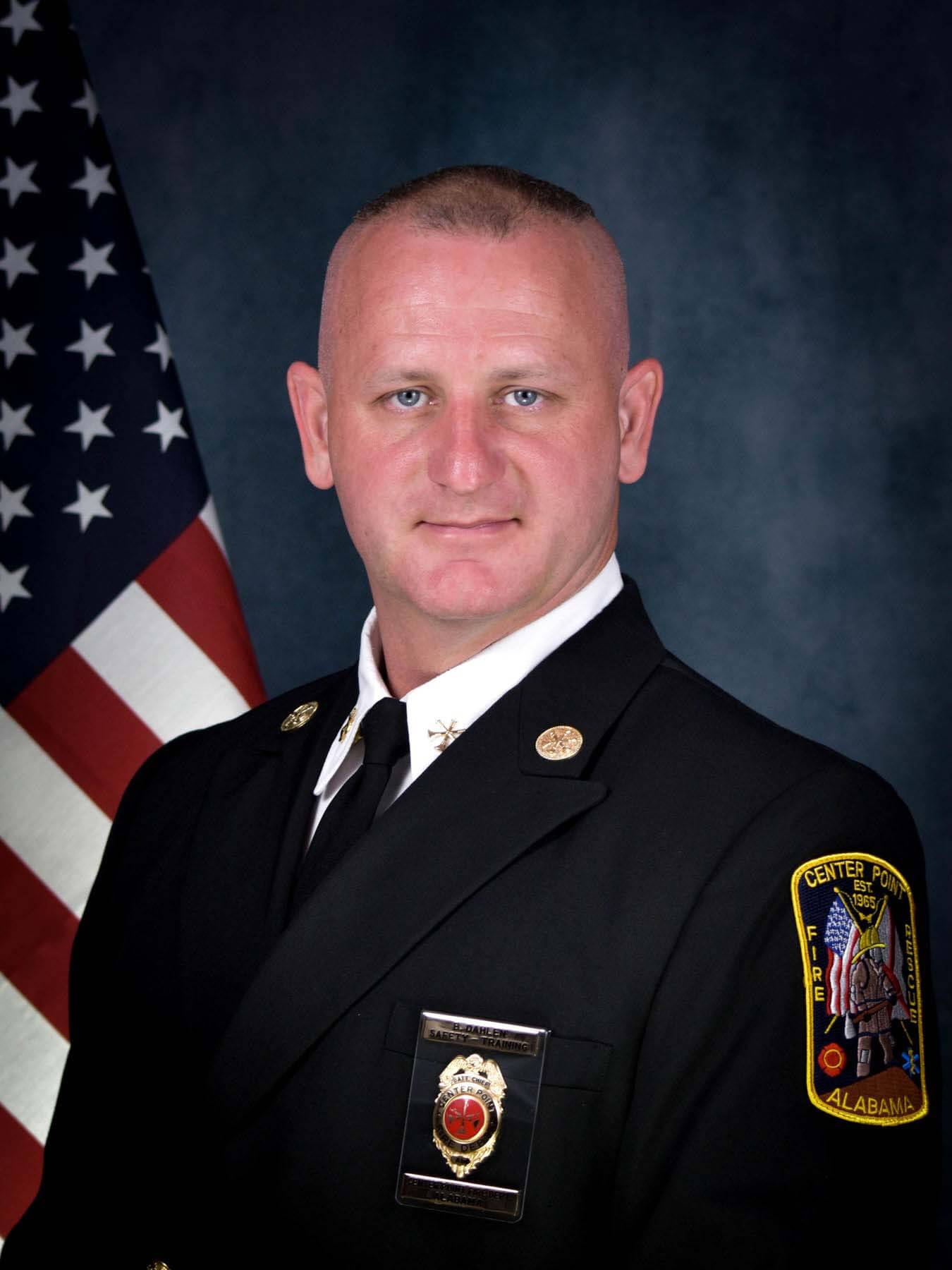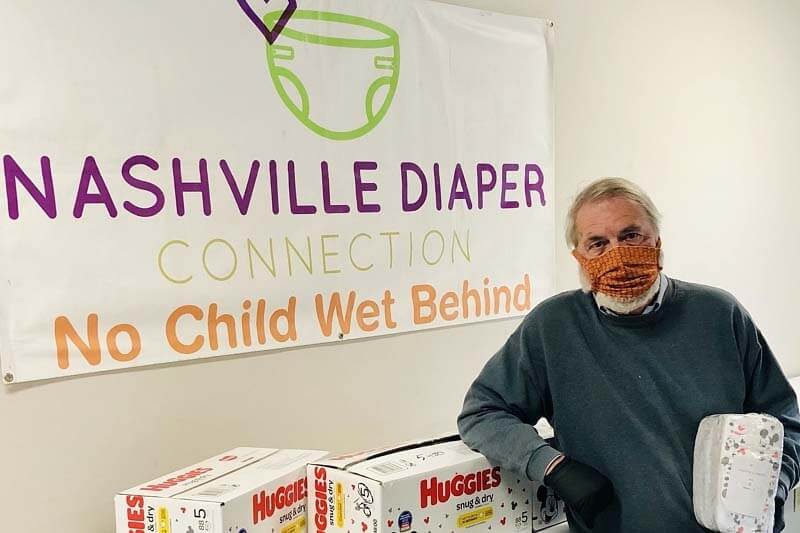We continue our “Heroes on the Frontlines” series this week by featuring four amazing people from around the South. Each of these people is meeting specific needs in their communities at this very unusual point in time. Meet Doug Adair, Ashley Flowers, Cindy Goble and Brandon Dahlen.
**********
Doug Adair, founder and president of Nashville Diaper Connection
Doug Adair founded Nashville Diaper Connection (NashDiaper)back in 2013 to meet the needs of those who can’t afford to diaper their children. That need has grown exponentially as a result of the Nashville tornado in early March and now the pandemic. Thanks to countless volunteers, donations — of both diapers and dollars, and agency partners that then distribute the goods, the Nashville nonprofit ensures babies’ bottoms are covered and this massive need for many Middle Tennessee families is being met — even during the pandemic. Meet Doug Adair, a frontline hero!

Why is there a need for diapers?
There are no federal, state or local safety nets for diapers. [Back in 2012,] you’d call Tennessee 2-1-1 for non-physical emergencies. There were 187 places you could get food if you were hungry and emergency financial assistance. There were two organizations that said they could help with diapers. One was closed, and the other put you on the waiting list. And then they’d give you 50 diapers and that was to last for four months. The more I looked into it, the more I got ticked. I had to either work to change the laws or put diapers on butts. I figured changing the laws would induce heartburn, and helping moms and babies would be more satisfying. We cleared out a spot in our garage and started buying diapers and providing them to St. Luke’s. I also did some research about starting a diaper bank and learned about the National Diaper Bank Network, which had started the year before. It took over a year to qualify to become a member of this great organization that supports diaper banks across the country. We had our first diaper drive in June of 2013. That year, we gave away 19,000 diapers. The second year, we gave away 69,000. By year three, we had outgrown the garage and rented a building. After nearly five years, we passed the 1 millionth diaper donated milestone. Last year we moved to an even larger location as we worked to meet more of the need in Nashville. We thought we would have our first million-diaper year in 2020. The tornadoes and COVID changed that. It will likely be closer to 2 million diapers we give away this year alone.
RELATED: Meet 3 People Doing Amazing Things: Heroes on the Frontline
How are you all still meeting these needs during the pandemic?
At our wrapping events, we break down diaper packs and repackage them in counts of 25. That way our diapers go further and each family gets the same number. We have 1,917 unique volunteers who work at NashDiaper, and we do remote wrapping events at companies and churches. With COVID, we had to stop accepting volunteers because it wasn’t safe for them or our folks. That’s part of the whammy, and the economy also had a whammy. We have had friends and family helping. Instead of having volunteers come to the diaper bank, we have taken the diapers to them. Our volunteer coordinator, Carey Morgan, is masterful. She has friends and neighbors with kids home from college and such who are wrapping the diapers, and she’s organized it in a way that’s covering a significant percentage of our wrapping needs.

In light of COVID and with so many of your partnering agencies closed, how are you getting the diapers to those who need them?
We have had a partnership with PENCIL and Metro Nashville Public Schools for about five years. As soon as MNPS announced meal and food distribution sites, we worked with PENCIL to coordinate so that at every meal and food distribution point, families could get diapers if they needed them. We are now distributing to 26 MNPS schools.
How can people support the efforts of NashDiaper?
What we need is money. Financial donations go so much further than diaper donations. We buy our diapers in 53-foot trucks, we don’t pay sales tax, and we can get two and a half times the number of diapers that you can buy retail for the same dollar amount. Thank goodness for the Community Foundation’s Tornado Response Fund and the Nashville COVID-19 Response Fund — we got a total of $35,000 from those relief funds, but that covers less than half of the diapers we distributed in March and April. A lot of supporters have stepped up, but we need more donations as we try to meet this vastly increased need.
Thank you, Doug! To learn more about Nashville Diaper Connection or to donate, visit nashvillediaperconnection.org, or check them out on Facebook, Instagram and Twitter.
*****
Ashley Flowers & Cindy Goble, charge nurses at Le Bonheur Children’s Hospital ER
Ashley Flowers and Cindy Goble are both charge nurses at Le Bonheur Children’s Hospital Emergency Department in Memphis, TN. Cindy works the day shift, and Ashley works nights, and both are working hard to protect Memphians now more than ever. Meet these healthcare heroes!

How is a typical work shift different for you now vs. pre-COVID-19?
Ashley: It is VERY different from our norm. We are typically a busy Emergency Department that sees 100,000+ patients a year. Because citizens are following the guidance to stay at home, our volumes are much lower. Despite that, there is a looming sense of dread. We typically operate with confidence, from instinct and experience, but there is no manual for this pandemic. Each decision we make has the potential to put a co-worker’s life in danger. Each patient could be the one we missed.
Cindy: We are no strangers to controlled chaos, but this unforeseen opponent has brought with it an eery calm. There are also so many more questions to field. Charge nurses are seen as the experts on the shift, but as the healthcare field learns more about COVID-19, there are seemingly neverending updates to policies and procedures that are staff members are counting on us to know.
Is there anything that people can do to better support the people on the frontline?
Ashley: There has been an outpouring of support for the frontline heroes here locally as well as nationally. I would have never guessed we would find ourselves in a time where healthcare professionals are seen as “soldiers.” It’s pretty neat, but to be honest, we don’t necessarily feel like heroes — any more than we do at other times. This is what we do. So if anything, while we are very grateful for the support and recognition from the community during the COVID pandemic, I would say it would be encouraging to feel the appreciation and acknowledgment year-round for the service we provide to the community.
Cindy: Please continue to stay at home and follow the CDC guidelines. We, just as much as you, want to move past the peak of COVID-19. We, too, are afraid for our parents, grandparents, and children.
What is the most important thing you want the general population to know about the work healthcare professionals are doing right now?
Ashley: We are here for you. We fight battles like this each and every day. We are more than willing to take care of COVID patients, or any other illness and injury.
Cindy: We are researching, updating policies and procedures, and training in preparation to protect and serve our community in whatever way is needed.
What is the one thing you look most forward to when we’re past COVID-19?
Cindy: Being able to go on vacation with friends or family.
Ashley: Just like the rest of the world, when we aren’t at work, we are “sheltering in place.” Our vacations and leisure activities have also been canceled and postponed.
Thank you, Ashley & Cindy, for your service and the work you do to protect the citizens of Memphis.
*****
Brandon Dahlen of Center Point Fire District
Brandon Dahlen is the Battalion Chief of Training and Safety at Center Point Fire District (CPFD) in Birmingham, AL. He’s working seven days a week during the pandemic, ensuring residents are safe and cared for now more than ever. Find out how his work has changed during COVID-19, learn how to better support workers like him and more. Meet this frontline hero!

Describe what a typical shift is like right now. How is it different now vs. pre-COVID-19?
Pre-COVID-19, a shift at CPFD was very much the same as far as daily, weekly and monthly work duties. The only variable was the type of incidents to respond to — medical, vehicle accidents, fires, etc. A typical shift right now is far from routine because of the constant change. As this event continues to grow and the infection spreads, first responder/public safety organizations are adapting as well. This pandemic is very complex and requires constant change and anticipation to ensure everyone is safe and prepared to perform their jobs. Our department is conducting daily operational briefings via the internet to inform everyone of the changes and information that is occurring daily.
RELATED: 7 Life Lessons We’re Learning From the Quarantine
What has been the most impactful experience you have had during the pandemic so far, either with a co-worker, volunteer outreach, someone whose emergency you are responding to etc.?
I would have to say it has been how much the community has come together to help each other in various ways. Right now, there is not a sense of policemen, firemen, EMT, nurses, physicians, etc., but a sense of togetherness and community. We have been able to help and assist various departments with PPE, and I am sure they would return the favor if ever needed.
On a sad note, one difficult situation we see daily is the restrictions of family members at hospitals. There have been instances of families not seeing their loved ones again once they leave in an ambulance. Knowing people are dying alone without the presence of their family around is very saddening.
Is there anything the general population can do to better support the people on the frontline such as yourself?
I would encourage everyone to follow the Governor’s and Alabama Department of Public Health guidelines. Everyone should stay home unless necessary to leave for essential functions, use good hand hygiene now as well as any other time, and follow social distancing recommendations. If anyone is experiencing COVID-19 symptoms, please either call one of the testing hotlines or check with your PCP and follow their recommendations. If an individual does require emergency services, it is best if they can meet the first responders outside in an open area utilizing 6-foot distancing. Furthermore, while everyone is spending more time at home, ensure you have working smoke detectors in your house.
What is the one thing you look most forward to when we are past COVID-19, either with work or in your personal life?
I am looking forward to spending time with my family and friends. I have been working almost seven days a week and look forward to being able to relax at home and hopefully enjoy the summer. My kids are still very hopeful we will be able to enjoy our annual summer beach vacation.
Thank you, Brandon, for your service on behalf of the Birmingham community!
**********
Financial stability often feels elusive, but it doesn’t have to. Get answers to 10 tough money questions to help you get your financial house in order. Click HERE.




















